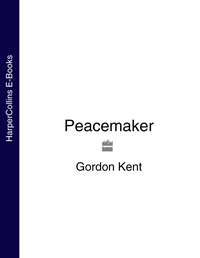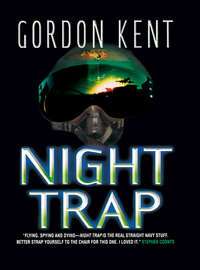
Полная версия
Hostile Contact
Across the road from the old temple was a cookshed. One old woman had a fire and a pot and a “cooler” full of water with cans of soda in it. You could get a really cheap lunch there, with a case of the shits thrown in for nothing. It was his and Bobby’s last-stand, desperation, no-fallback dead drop.
“Package for Mister Brown?” he said. He held up an American five.
“Ten dolla.” Prices had gone up.
He handed over a ten and, wonder of wonders, she fished out a brown envelope with a bulge in it. Inside was a plastic canister with a roll of film. That little sonofabitch! He took back his doubts about Bobby.
A piece of paper was in the canister with the film. One word had been scrawled on it: Scared.
It made Piat smile.
He wrapped three American hundreds into a tight roll and stuffed them into the canister and put the canister back into the envelope with the piece of paper, on which he had written, “I’ll be back.”
“Give to Mister Black when he comes, okay, Mama?”
“Ten dolla.”
Piat headed for the airport.
Dar es Salaam.
Two hours later than he had demanded, as Lao was smoking and staring at the wall, his stomach seething, the photos came through from Jakarta. They were not particularly clear, but one was clear enough for him to see that Bobby Li had been close to both Qiu, the dead man, and the Caucasian. Too close. Had he spoiled the meeting?
Lao tried to see the logic of such a thing. He had sent a case officer to Jakarta to run things, and he had got killed; and he had sent Chen’s old agent, Li, to identify Chen or Shreed if either showed at the meeting, and—and Li had then intruded on the meeting that was detailed in American Go. Doing so was far beyond the responsibility of an agent. It was a kind of hubris. Had Li thought that Lao wouldn’t know?
Or had he had some other, more important agenda? Had he wanted to eavesdrop? But why?
Li’s action suggested another set of orders, because Li, in Lao’s experience, was an insecure man who always needed orders: the only things he did on his own were acts of desperation. So, who else might be giving him orders? The question chilled Lao because it came from the ice of a case officer’s worst fear—that his agent was a double. This led to a second, colder question: double agent for whom? He couldn’t forget that Li had been Chen’s agent.
He shook his head. He didn’t believe in the game of mirrors. He ground out his cigarette and called in Jiang, an aging captain with a good bureaucrat’s sense of how to get things done. Lao brought up on the computer screen a photograph of the Westerner leaving the Orchid House. “I want to know who that Westerner is. He was in Jakarta two hours ago: check the manifests of flights in and out for five days back and the outgoing from now on; I have a suspicion he will leave Jakarta soon. Check with embassy security in Jakarta; one of their people followed an American, maybe this man, to a hotel. Get a name if you can. Then check the hotels for Americans who were there yesterday and today. Ask if they have been asking for directions to Fatahillah Square and the Orchid House in the minipark.” He squinted at the screen. “This man was probably with somebody else—up to four others, maybe. A counter-surveillance team. Maybe traveling together, but not necessarily.” He lit another cigarette. “Then get on to the Jakarta police and find out if they have any reports on an incident at the Orchid House this morning.”
The captain gave a forward jerk that suggested a bow. Both were in civilian clothes; military etiquette did not seem quite right.
“I am going home for lunch,” Lao said. It was, in fact, only nine in the morning. The captain’s face was impassive.
Lao drove to his rented house in a suburb where most of the diplomatic community lived (not so with most of his Chinese colleagues, who huddled around the embassy), kissed his wife, American-style, and responded to her questions about his day, then put his finger to his lips as he led her to the bedroom. The house was bugged; the phone was bugged; she had years ago given up trying to know how his days really were. Yet they had great affection for each other, despite their arranged marriage and his profession and its conditions. Sometimes, she knew, he came to her like this to make love when he wanted to make his mind a blank.
Lao wished he could talk about his problems to her. Or perhaps not. She might say, as she had once when they were test-driving a new car in Beijing and nobody could possibly have been listening, “Don’t you ever dream of living like other people?”
8
Washington.
Rose met her husband at Dulles airport. His embrace was hard, quick, eager. He looked worn out. “Jakarta was a bust,” he said as he settled in the car.
“I thought it was supposed to be a walk in the park.”
He folded his arms and sank lower in the passenger seat. “The case isn’t what we thought.”
“Mike should have his ass hauled for sending you.” Rose accelerated to get into the traffic heading toward Washington.
He looked out the window. A deer was standing by the side of the six-lane highway. He frowned. “I wasn’t very good out there.” He flexed his bad hand. “I’ll tell you the worst of it up front: there was shooting; a guy was killed; I got out by the skin of my teeth.”
She gasped, bit back some comment. “I’m just glad you’re home.” She put her hand on his.
“Everything went wrong,” he said. “Triffler never got there, one goddam thing after another.”
“What happened?”
“Everything.” He turned his hand over—the bad one—and squeezed her fingers. “‘This time, Amelican Fryboy, you make big mistake!’”
It had started to rain. He stared out the side window again, dimly seeing his own reflection, hers. He put his hand, the bad one, on her thigh, and she covered it with her own. “It was great to be doing something, though,” he said.
To his astonishment, she laughed. “You’re going to be doing a lot.” She reached across him and opened the door of the glove compartment and pulled an envelope into his lap. He saw the naval return address and his own name, and he opened the envelope and began to read, his heart swelling as he did so. “‘You are ordered to proceed to Naval Air Station, Miramar, California, for a period of…’
“Sonofabitch,” he said. He was frowning.
“I thought you’d be beside yourself!”
“I am, I am—but—There’s the case, you know—Sleeping Dog—I’ve got some ideas I want to share with Mike—” He looked again at the orders. “My God, another MARI det—a week ago I’d have killed for this—”
He had called Mike Dukas from the west coast and invited him for dinner, something he broke to Rose only as they were nearing their rented house. “I’ve got to talk to him about the case,” Alan said.
“You’ve got orders to Miramar.”
“I let him down in Jakarta. I want to make it up to him.”
“Alan, the Navy’s given you a new job—you’re not an NCIS agent!”
“Mike’s my friend.”
“Mike should have his ass kicked.”
He kissed her cheek. She steered into their weedy driveway and turned the car off. “I wish you’d told me that you’d invited him,” she said.
“You’re right; I should have. I didn’t think. I was stupid.” They were in the house by then. He kissed her again, and she smiled and stood back from him. “Well—if working for Mike is this good for you—”
He embraced her. “I’ll get a shower.” He grinned. “And I know I’m still in the Navy.” As he headed up the stairs, he hugged the orders against his chest with his good hand.
Twenty minutes later, Dukas’s battered car pulled up behind theirs in the too-short driveway, and there he was, worried and guilty.
“Hey, babe.” He kissed her as he came through the door. Rose held herself stiffly, and he felt it and got the message. “Where’s the great man?” He dumped his attaché in one of the ugly chairs. “Rose, what’s wrong?”
“If you don’t know, there’s no point in telling you!”
Dukas blew out his breath and headed upstairs to see Mikey, his godson. Coming down again, he tested the atmosphere—Rose slamming things down in the kitchen, a smell of onions and garlic frying. Dukas positioned himself in front of Alan, who was sitting on the sofa and wincing with each slam of a pan lid in the kitchen. “Al, it was all my fault. I feel like shit about it.”
“No.” Alan looked up at him. Something thumped in the kitchen, maybe a piece of meat being thrown down on the cutting board. “Let’s get on with the case.”
Dukas flinched as a cupboard door slammed. “Rosie, can I help?” he shouted.
Rose appeared, no smile, a chef’s knife in her hands. “You’re unbelievable, Mike. You almost got my husband killed!”
“What can I say?” he muttered.
“Try ‘I’m sorry!’”
“Okay—Rosie, I’m sorry.”
Rose folded her arms. The chef’s knife stood straight up by her right shoulder like some kind of emblem in a statue of one of the more severe saints. “Saying you’re sorry isn’t enough!”
Dukas tried to grin, and Rose, uncharmed, walked out. “I should have never let you go,” Dukas sighed to Alan. “I’ve already had my ass chewed by two experts at ONI. CIA, Embassy Jakarta, and State all want a piece of me. Rose has to stand in line.”
“And I should have told her I’d asked you to dinner. We’ll get over it; Rose’ll get over it. What’s going on with Sleeping Dog?” Alan stood up, restless, wanting to move, but the room was too small. “The way I see it, that comm plan wasn’t dead; it was active as hell, so what about everything else in the file? Let’s go through it piece by piece and figure out—”
Dukas tried to raise a hand to Alan’s shoulder, winced, and settled for putting a hand on his arm. “I’ve been through the file—several times. I can tell you this: we thought the Jakarta comm plan was the only action item there. We were wrong. Maybe we were supposed to think the comm plan was the action item, but there’s also action in Seattle.” They sat down, their knees almost touching, their voices low because the small woman in the kitchen was still slamming things around. Dukas leaned forward, his face only inches from Alan’s. “After I talked to you in Jakarta, I began to check Sleeping Dog out. I got a retired FBI guy who’d been the case officer in ninety-two. He wouldn’t say much, but he’d at least admit that he remembered it—it was a real case, meaning that the whole thing isn’t a crock of shit. Some of it, at least, is real. Sally Baranowski insists that the Jakarta comm plan wasn’t in Sleeping Dog, but—news from town, kid, here comes a big one—” He bent even closer to Alan’s ear. “The Jakarta comm plan was part of Chinese Checkers—George Shreed’s personal map for meeting with his control.”
Alan stared at him. He was processing it—Jakarta, Shreed, Chinese Checkers. “The Chinese?” he said.
“I think, yeah. Who else has Chinese Checkers?”
“Well—the Agency—”
“Yeah, but the Agency isn’t going to lay a Shreed comm plan on us and then use it to try to kill you!”
“Well,” Alan said grudgingly, “I’m not sure anybody tried to kill me.” He was frowning, looking away from Dukas.
Dukas leaned in close again. “It’s the Chinese, stupid. Get it?”
Dar es Salaam.
By midnight, Colonel Lao knew enough about what had happened in Jakarta to make him start using obscenities in his conversation—always a sign of frustration in him. Inwardly, he cursed: he cursed the distance between Dar and Jakarta; he cursed the surveillance people there and the fact that he couldn’t debrief them himself. Had they been so incompetent that they had got themselves shot at? Had they frightened off Chen and Shreed? Had there been some other failure?
“Unlikely,” he said aloud. He believed in likelihoods, probabilities: when you must choose, choose the probable.
Start with the certain, he thought.
Nothing was certain.
Start with the probable, then.
What was probable was that the American in the Orchid House had been sent by the CIA. If Shreed was dead, then it was probable that the CIA had his files, including the comm plan; it was probable that they had tested the plan by planting the mark. Therefore, the man who had appeared at the meeting place with a magazine under his arm had been a CIA agent—unless Shreed was not in fact dead. If Shreed was not dead, then what was probable was that the American in the Orchid House had been sent by him.
What was utterly uncertain was why and how the meeting in the Orchid House had degenerated into a shootout. Such things were remarkably rare—so rare that most operations officers hardly ever even carried guns, much less used them.
James Bond, Lao thought with a sneer.
What went wrong?
A fuller report had landed on his computer. The American (if he was) had had no gun and had not fired. Others in the Orchid House, apparently locals, had been armed and had fired. And his people had returned the fire. All this suggested not two sides, but three, with the American seemingly at a different level of involvement—almost, in a sense, a bystander.
A third force. Maddening.
And the Americans as bystanders. Odd.
And then the odd behavior of Chen’s old agent, Li.
Analysis of airline manifests showed that an American named Alan Craik had flown into and out of Jakarta on the right days, and a report from the agent who had checked the hotels said that Craik had asked about the location of the cannon and the Orchid House and had then been gone for part of an afternoon. The officer in Jakarta had had to winnow down a list of possibles to get to this one, a list that included a Dutch businessman, an American tourist, two Japanese tarts, and an airline steward, but Craik seemed the likeliest because of the question about the park. Lao himself became convinced when a simple check of a military registry turned up Craik as a serving officer in naval intelligence—not quite real intelligence, to Lao, but close enough. Although why he was traveling under his own name to a hostile agent contact, Lao could not begin to guess. Madness! Amateur!
Конец ознакомительного фрагмента.
Текст предоставлен ООО «ЛитРес».
Прочитайте эту книгу целиком, купив полную легальную версию на ЛитРес.
Безопасно оплатить книгу можно банковской картой Visa, MasterCard, Maestro, со счета мобильного телефона, с платежного терминала, в салоне МТС или Связной, через PayPal, WebMoney, Яндекс.Деньги, QIWI Кошелек, бонусными картами или другим удобным Вам способом.







